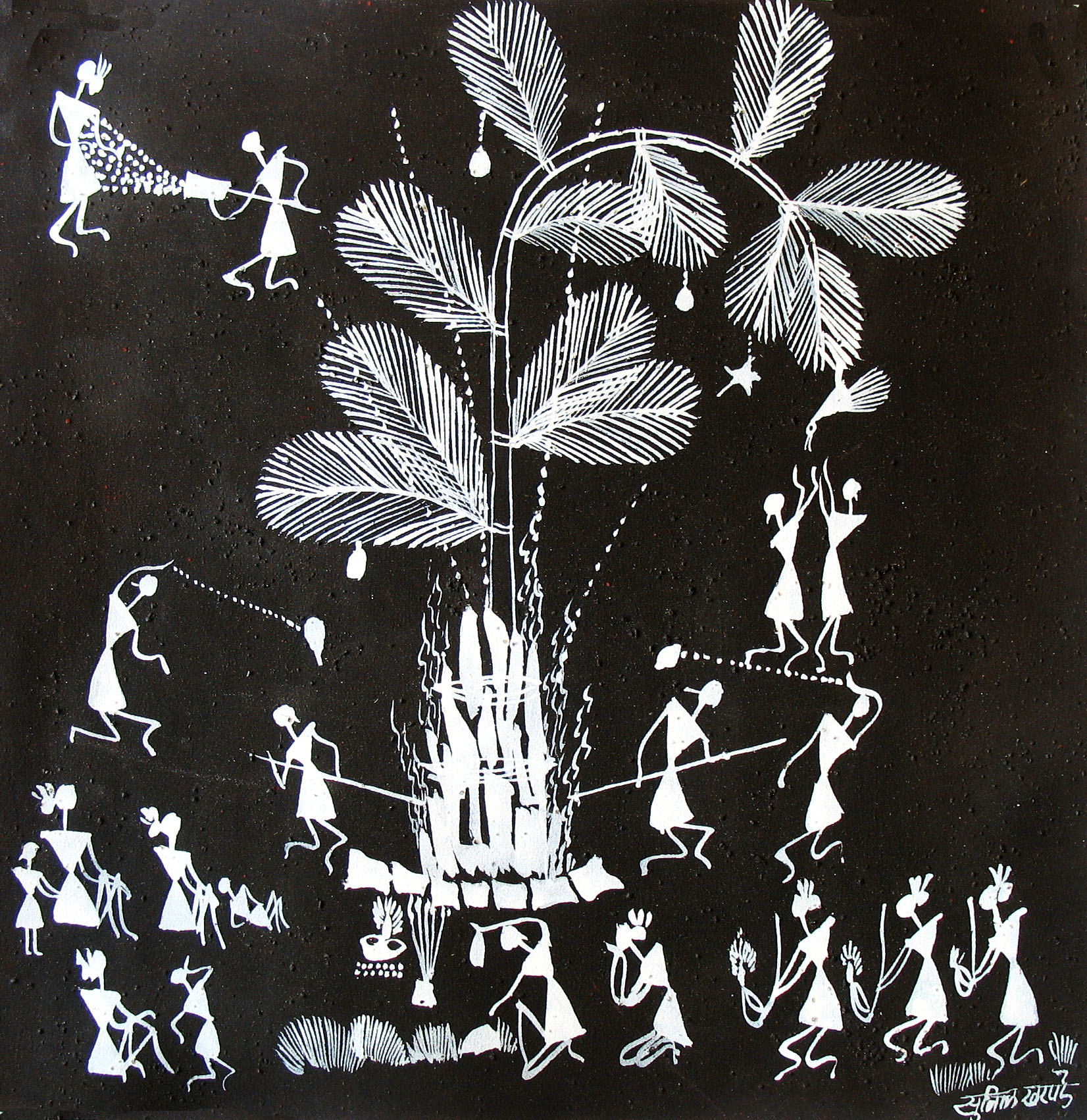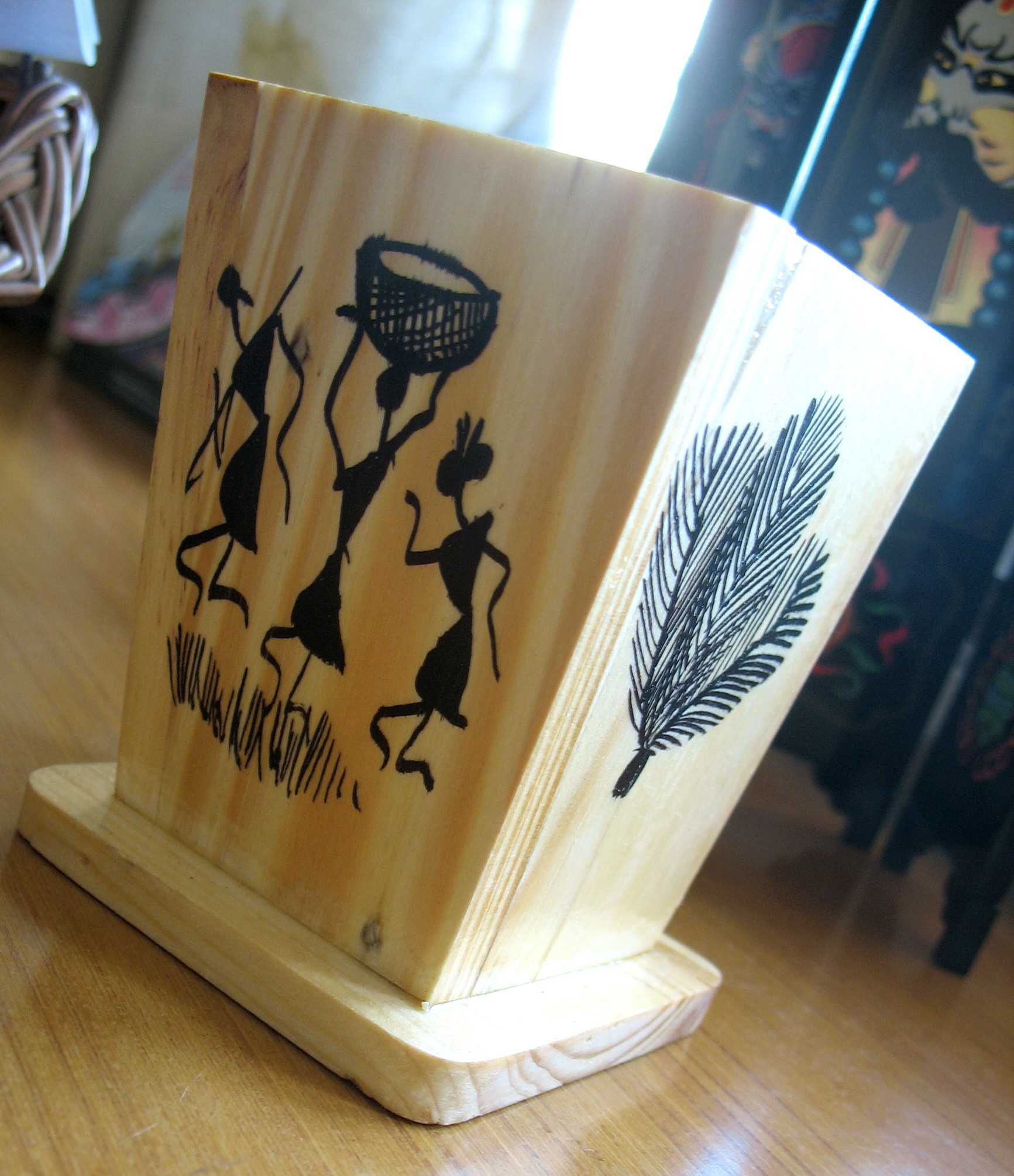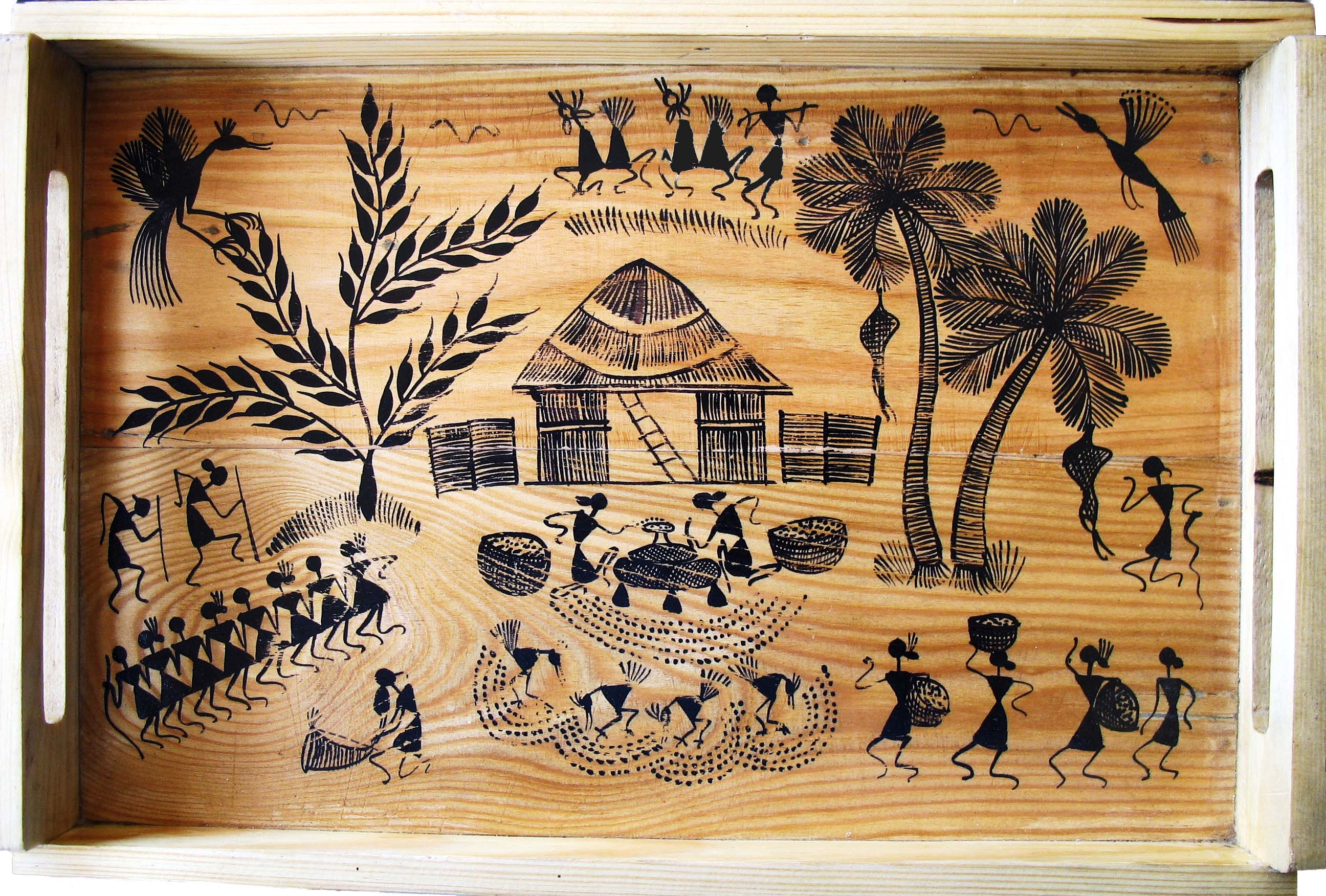These are photos of folk paintings of the Warli tribe, a tribe from north west of Mumbai. (A link to sketches and designs of Warli Art is given at the bottom of this post). Warli Art was first discovered in the early seventies. Its roots can be traced to the 10th century AD. Wall Murals of these paintings look beautiful. It is believed by historians that the Warli tradition of art is as old as 3,000 BC.
Warli paintings represent the daily life and events of the Warli tribe of Maharashtra. These unique representations use a mud base and mainly one color – usually white, with perhaps dots of red and yellow. This white colour is of natural origin, made from ground rice. Traditionally, these paintings do not use straight lines and instead the lines are made by using dots and dashes. They use triangles, squares and circles though. The limbs of the figures are always flowing, graceful and curved. The curved lines of the limbs are an important feature of warli art.
The first picture has a red natural base with the white rice paints to make the drawings. Many of these paintings and art style depict dances of the tribes. The dancers hold one another around their waists move around the musician.
This is a black mud base and white rice paints used for the drawings. These paintings use a circle, a triangle and a square. The circle represents the sun and the moon, the triangle mountains and trees. The square seems to represent a “sacred enclosure” or a piece of land. Human and animal bodies are represented by two triangles joined at the tip – the upper triangle depicts the trunk and the lower triangle the pelvis. Their precarious equilibrium “symbolizes the balance of the universe, and of the couple.”
This art is now used for commercial purposes and paper is used for the paintings. Various items like trays, pen stands and coasters decorated with this style of painting are available in the market.
Here is a box of wooden coasters with Warli drawings on them.
This is a picture of a wooden pen-stand with Warli drawings.
This is a pretty wooden tray with village life depicted in the warli drawings. Activities like dancing and community living are portrayed here.
(These paintings and objects were purchased by me from the Warli people)
Related Images: Warli Art - Sketches and Drawings or Truck Art and Truck Painting or The Tarpa Wind Instrument of Indian Tribes or Indian Artisans making small statues
Or Tinga Tinga painting from Dar-es-Salaam Tanzania and Unique painting at the Louvre
Warli paintings represent the daily life and events of the Warli tribe of Maharashtra. These unique representations use a mud base and mainly one color – usually white, with perhaps dots of red and yellow. This white colour is of natural origin, made from ground rice. Traditionally, these paintings do not use straight lines and instead the lines are made by using dots and dashes. They use triangles, squares and circles though. The limbs of the figures are always flowing, graceful and curved. The curved lines of the limbs are an important feature of warli art.
The first picture has a red natural base with the white rice paints to make the drawings. Many of these paintings and art style depict dances of the tribes. The dancers hold one another around their waists move around the musician.
This is a black mud base and white rice paints used for the drawings. These paintings use a circle, a triangle and a square. The circle represents the sun and the moon, the triangle mountains and trees. The square seems to represent a “sacred enclosure” or a piece of land. Human and animal bodies are represented by two triangles joined at the tip – the upper triangle depicts the trunk and the lower triangle the pelvis. Their precarious equilibrium “symbolizes the balance of the universe, and of the couple.”
This art is now used for commercial purposes and paper is used for the paintings. Various items like trays, pen stands and coasters decorated with this style of painting are available in the market.
Here is a box of wooden coasters with Warli drawings on them.
This is a picture of a wooden pen-stand with Warli drawings.
This is a pretty wooden tray with village life depicted in the warli drawings. Activities like dancing and community living are portrayed here.
Related Images: Warli Art - Sketches and Drawings or Truck Art and Truck Painting or The Tarpa Wind Instrument of Indian Tribes or Indian Artisans making small statues
Or Tinga Tinga painting from Dar-es-Salaam Tanzania and Unique painting at the Louvre





Madam,
ReplyDeleteThankyou for bringing to our attention the lack of attribution to your photograph. This was an oversight, as you can see from this post itself and all others on our blog that we have linked back to all the original sources. A link to your blog has been provided as the photo source. We apologise for any inconvenience caused and appreciate your kindness in sharing your pictures. Thank you.
Thanks for the prompt response. :)
ReplyDeletewow...lovely pictures.
ReplyDeleteim trying to learn this form of art and your pictures inspire me soooo much.
Thank you.
Thanks for the comment Chukky. I find that people download these photos but don't bother to comment or say a word of thanks. I am glad that these photographs are of help to you and I hope you have checked out the sketches as well.
ReplyDeleteThese are lovely!
ReplyDeleteMay I please know where you got these?
I bought these from the Warli people, the tribals. We had gone to Diwekarwadi and in one of the resorts a tribal person who had actually painted these had come. He had an exhibition there.
ReplyDeleteOh wow!Thank you for the fast reply.
ReplyDeleteI would love to go there!